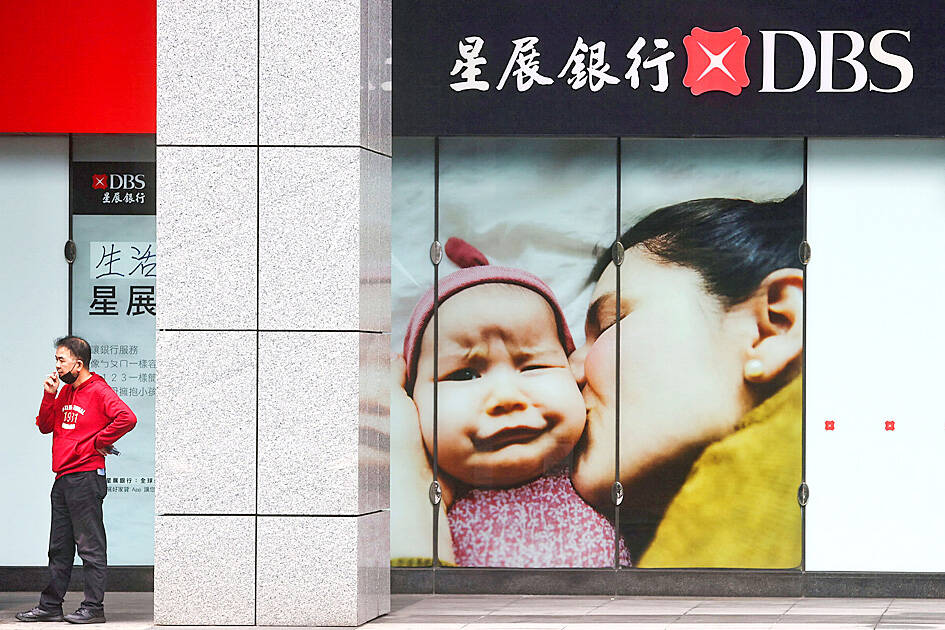DBS Bank Ltd has lowered its growth forecast for Taiwan’s economy this year to 2.9 percent from the 3.9 percent it predicted in July amid growing signs of a manufacturing downturn.
Economic indicators point to a downturn, with the manufacturing purchasing managers’ index contracting last month, export orders falling in July and industrial production growing at a slower pace in July, DBS Bank senior economist Ma Tieying (馬鐵英) said in a report released yesterday.
The Singapore-based bank is the first financial services company to cut Taiwan’s forecast GDP growth to below 3 percent.

Photo: Ann Wang, Reuters
Warning: Smoking can damage your health
Although Taiwanese exports surged 14 percent annually in July, the momentum would slow over the next three months, as exports are correlated with export orders and industrial production, Ma said.
Exports would remain in positive territory, but growth would be milder, likely by a single-digit rate, she said.
Demand for Taiwanese electronic components, as well as information and communications technology products, lost steam in July because of the deterioration in global economies, lower consumer disposable income amid surging inflation and rising interest rates, Ma said.
Although the ongoing technology downturn is a typical and cyclical adjustment, it would be a drag on Taiwan’s economy, Ma said, adding that the inventory-to-shipment ratio of Taiwan’s electronic components sector is close to the level in early 2019, when destocking took about two to three quarters.
Destocking is likely to continue until the end of June next year, she said, adding that leading chip companies such as Taiwan Semiconductor Manufacturing Co (台積電) and Vanguard International Semiconductor Corp (世界先進) are on the same page.
DBS Bank also lowered its forecast for Taiwan’s GDP growth next year to 2.3 percent, from 2.8 percent.
On a quarterly basis, Taiwan’s GDP could shrink at most by 1 percent year-on-year in the fourth quarter of this year or first quarter of next year, before returning to positive territory in the following quarters, Ma said.
However, the bank believes that Taiwan’s economy could avoid a contraction, with consumption and the services sectors likely providing a cushion to offset the decline in exports, Ma said.
With the US Federal Reserve expected to continue raising interest rates, Taiwan’s central bank is forecast to hike its rate by 12.5 basis points each this month and in December to rein in inflation, Ma said.
DBS does not expect the central bank to raise interest rates further next year as it shifts to a more a balanced policy stance after seeing an easing in domestic inflation, she said.

MULTIFACETED: A task force has analyzed possible scenarios and created responses to assist domestic industries in dealing with US tariffs, the economics minister said The Executive Yuan is tomorrow to announce countermeasures to US President Donald Trump’s planned reciprocal tariffs, although the details of the plan would not be made public until Monday next week, Minister of Economic Affairs J.W. Kuo (郭智輝) said yesterday. The Cabinet established an economic and trade task force in November last year to deal with US trade and tariff related issues, Kuo told reporters outside the legislature in Taipei. The task force has been analyzing and evaluating all kinds of scenarios to identify suitable responses and determine how best to assist domestic industries in managing the effects of Trump’s tariffs, he

TIGHT-LIPPED: UMC said it had no merger plans at the moment, after Nikkei Asia reported that the firm and GlobalFoundries were considering restarting merger talks United Microelectronics Corp (UMC, 聯電), the world’s No. 4 contract chipmaker, yesterday launched a new US$5 billion 12-inch chip factory in Singapore as part of its latest effort to diversify its manufacturing footprint amid growing geopolitical risks. The new factory, adjacent to UMC’s existing Singapore fab in the Pasir Res Wafer Fab Park, is scheduled to enter volume production next year, utilizing mature 22-nanometer and 28-nanometer process technologies, UMC said in a statement. The company plans to invest US$5 billion during the first phase of the new fab, which would have an installed capacity of 30,000 12-inch wafers per month, it said. The

Taiwan’s official purchasing managers’ index (PMI) last month rose 0.2 percentage points to 54.2, in a second consecutive month of expansion, thanks to front-loading demand intended to avoid potential US tariff hikes, the Chung-Hua Institution for Economic Research (CIER, 中華經濟研究院) said yesterday. While short-term demand appeared robust, uncertainties rose due to US President Donald Trump’s unpredictable trade policy, CIER president Lien Hsien-ming (連賢明) told a news conference in Taipei. Taiwan’s economy this year would be characterized by high-level fluctuations and the volatility would be wilder than most expect, Lien said Demand for electronics, particularly semiconductors, continues to benefit from US technology giants’ effort

‘SWASTICAR’: Tesla CEO Elon Musk’s close association with Donald Trump has prompted opponents to brand him a ‘Nazi’ and resulted in a dramatic drop in sales Demonstrators descended on Tesla Inc dealerships across the US, and in Europe and Canada on Saturday to protest company chief Elon Musk, who has amassed extraordinary power as a top adviser to US President Donald Trump. Waving signs with messages such as “Musk is stealing our money” and “Reclaim our country,” the protests largely took place peacefully following fiery episodes of vandalism on Tesla vehicles, dealerships and other facilities in recent weeks that US officials have denounced as terrorism. Hundreds rallied on Saturday outside the Tesla dealership in Manhattan. Some blasted Musk, the world’s richest man, while others demanded the shuttering of his